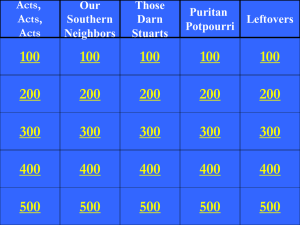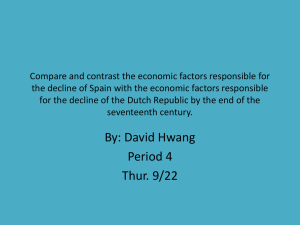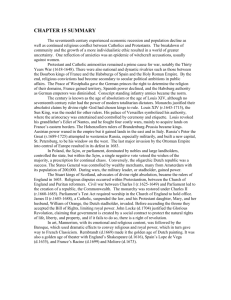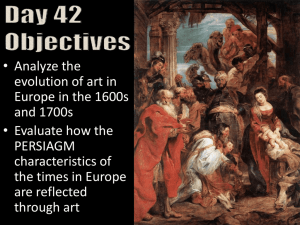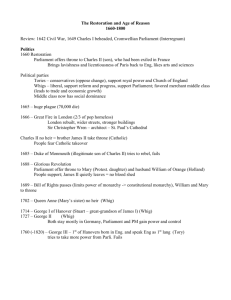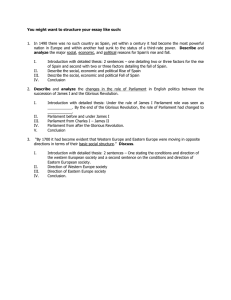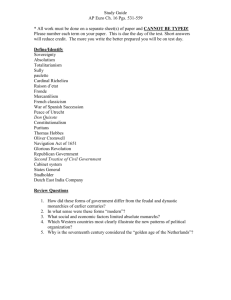Chapter 16 Reading Study Guide
advertisement
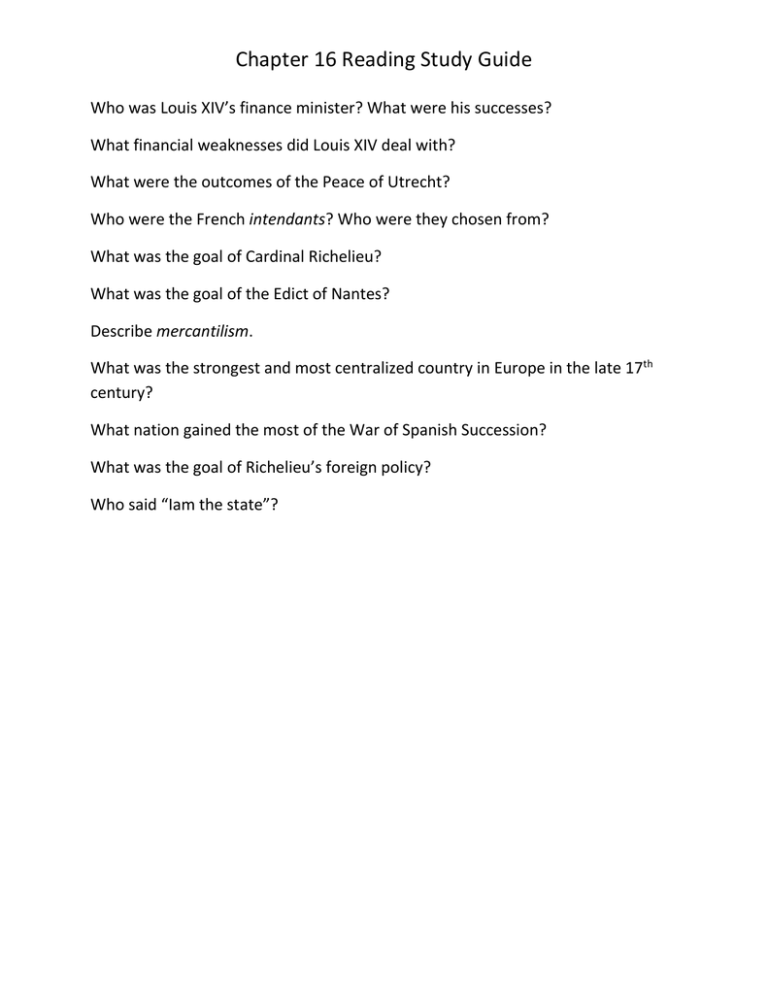
Chapter 16 Reading Study Guide Who was Louis XIV’s finance minister? What were his successes? What financial weaknesses did Louis XIV deal with? What were the outcomes of the Peace of Utrecht? Who were the French intendants? Who were they chosen from? What was the goal of Cardinal Richelieu? What was the goal of the Edict of Nantes? Describe mercantilism. What was the strongest and most centralized country in Europe in the late 17th century? What nation gained the most of the War of Spanish Succession? What was the goal of Richelieu’s foreign policy? Who said “Iam the state”? Chapter 16 Reading Study Guide Decline of Spain (p. 534-538) What enabled Spain to have absolutist government before France? Who did Philip III expel? Why? What was the effect on Spain? Describe 3 reasons for Spain’s economic decline. How did Spanish King’s repeatedly deal with their national debt? How did Don Quixote display the decline of Spain? Colonial Administration (p. 538-539) Define Viceroyalties. What system of administration did the Spanish copy from France? Define Quinto. Culture of Absolutism (p.539) Where was baroque art popular? What language became the common language of European elite? Baroque Art & Music (p.539-540) Define Baroque. (Describe its style) How did it relate to the Counter Reformation? Who was Peter Paul Reuben’s? How did Bach’s music exemplify the baroque style? Court Culture (p.540-541) What was the “sense”/purpose of the palace at Versailles? How was Versailles and its court life meant to influence the French nobility? French Classicism (p.541-542) Define French Classicism. What social criticisms did playwright Moliere make? Where did he stop short? Chapter 16 Reading Study Guide Constitutionalism (p.542) Define Constitutionalism. Where did it develop? What is a constitutional monarchy? Absolutist Claims in England (p.543-544) What skills made Elizabeth I successful? Who succeeded Elizabeth on the throne of England? Where was he from? What did James see as the basis of his rule? What power did the House of Commons have over the English king? How were the members of Commons different during James’ reign than Henry VIII’s? How were English nobles/gentry different from their French counterparts? What did they desire in return? Religious Divides (p.544-546) Describe the desires of the English Puritans. How did the “Protestant Ethic” appeal to the English? Just know that many of these guys were members of parliament. Identify Charles. What religion did he seem sympathetic to? What did William Laud try to impose on the Scottish church? What was their response? Describe “Ship Money.” Why didn’t parliament trust Charles with an army? What was the “Long Parliament?” Describe the Triennial Act. How did the English treat the Irish? What did this lead to in 1641? What even immediately began the English Civil War? When was the English Civil War? What was the question the war attempted to answer? Who won? Chapter 16 Reading Study Guide What happened to Charles I? Puritanical Absolutism in England: Cromwell and the Protectorate (p.546-547) What was the Commonwealth? Describe the Protectorate. Who ruled? What type of government was it? What was the result of Instrument of Government? How did the Protectorate regulate English society? What did Cromwell do in Ireland? Describe the Navigation Acts. The Restoration of the English Monarchy (p.547-548) What was restored? Who took the throne? What was the Test Act? How did Charles II get along with Parliament? Who succeeded Charles II? Why did the majority of Englishmen dislike James II? Who did Parliament invite to take James II’s throne? The Triumph of England’s Parliament: Constitutional Monarchy and Cabinet Government (p.548-549) What was the “Glorious Revolution?” What did William and Mary accept in return for the throne? Describe the English Bill of Rights and what it guaranteed. What ideas did John Locke put forth in his Second Treatise on Government? What were the limits of the Glorious Revolution? The Dutch Republic in the Seventeenth Century (p.549-533) When did the Dutch get their independence from Spain? (“confirmed” as McKay puts it) When was the Dutch “golden age?” Chapter 16 Reading Study Guide What did the States General handle? What was the Stadholder? What family was chosen as stadholder? Who controlled the Dutch government? What led to Dutch prosperity? How did the Dutch treat religion? How did the Dutch East India Company operate?

